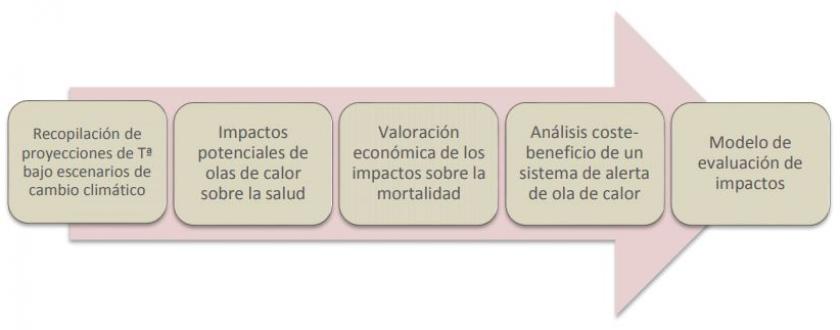OSATU. Heat waves and health: impacts and adaptation in the Basque Country
Description of the case study
The main objective of the OSATU project is to assess the health impact of climate change-induced extreme temperatures in the Basque Country. The project methodology includes key factors for decision-making relative to preventing the health impacts of heat waves. The project results are also useful for adapting early warning plans to expected future climate changes. The success of OSATU has led to a second phase of the project in 2018-2019 called OASIS, funded in the second round of KLIMATEC grants from the Basque Government.
This is the first study to assess the health impacts of extreme climate events under various climate change scenarios in the Basque Country. Although there are plans in place to prevent and alleviate the health impact of heat waves in the Basque Country, these sorts of extreme meteorological phenomena will be more frequent as a result of climate change.
According to the World Health Organisation (WHO), heat waves are one of the most dangerous extreme meteorological phenomena and lead to an increase in morbidity and mortality. In its last report, the Intergovernmental Panel on Climate Change (IPCC) warned that global warming has already led to more frequent heat waves and that we can expect more frequent, intense and longer-lasting heat waves over the coming decades.
Health authorities (in this case regional) should take the possibility of more frequent extreme heat events into consideration and develop contingency plans for protecting their citizens from this risk. Urban areas will have to tackle not only climate change but urban development and population growth—factors which could exacerbate the potential health impacts.
The main objectives of the OSATU project are:
- Analyse data on projections of maximum temperature and the potential incidence of heat waves in the Basque Country.
- Determine the potential impact of temperature on human health, specifically on the risk of mortality.
- Carry out an economic analysis of the impacts on the risk of mortality.
- Compare the costs and benefits of Heat Wave Warning Systems (SAOCs).
- Make recommendations which help improve the efficiency of SAOCs.
- Create a reference framework for reviewing and updating early warning and prevention plans relative to the effects of heat waves on human health in the Basque Country.
The main results of the research carried out are as follows:
- Characterisation of the effect of heat waves on human health and contextualisation of the project within both European-level priorities and the Basque Government’s Klima 2050 Strategy.
- Analysis of temperature projections for the selected study zones based on two emissions scenarios.
- Assessment of the impacts of extreme temperatures on the risk of mortality in the population.
- Application of the methodology in four Basque municipalities to produce relevant information which may contribute to climate change adaptation decision-making.
- Development of a methodology for determining the potential impacts of extreme temperatures on human health, an economic assessment of the impact of heat waves on mortality and a cost-benefit analysis of a heat wave warning system.
- Gathering of the first results for each zone and development of conclusions, limitations and recommendations.
- A series of opportunities have been identified for future public health research relative to climate change.
Case study developed and implemented as a climate change adaptation measure.
IHOBE-Basque Government, BC3.
Additional Information
The OSATU project is led by IHOBE (a public body accountable to the Basque Government) in collaboration with the BC3 research centre.
Success: pioneering research into heat waves and health in the Basque Country; the project results include a methodology adapted to the Basque Country which can be transferred and replicated in other regions.
Limiting: only data on mortality have been analysed, not morbidity; variables such as the urban heat island effect require analysis with greater spatial detail; the impact of persistent maximum temperatures has not been analysed.
The cost-benefit ratio identified in the study shows that heat wave warning and prevention systems are highly cost-effective adaptation measures, i.e. the economic benefits far outweigh the costs.
The OSATU project and its successor, OASIS, have been supported by Klimatek grant funding for climate change adaptation R&D, innovation and demonstration projects. Said funding was launched in response to the goals and guidelines set out in the KLIMA 2050 Strategy for the Basque Country, which in turn has been developed in accordance with the EU Adaptation Strategy (European Commission, 2013).
2016-2017 (1 year - complete)
Reference information
PYRENEAN CLIMATE CHANGE OBSERVATORY
Avenida Nuestra Señora de la Victoria, 8
22.700 - Jaca
Huesca - España
+34 974 36 31 00
info_opcc@ctp.org





